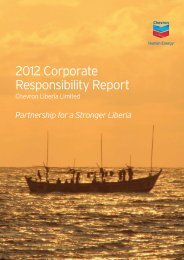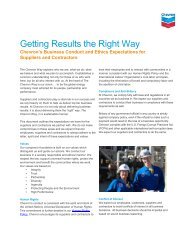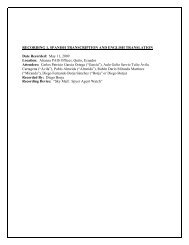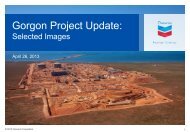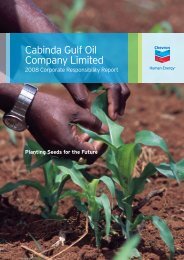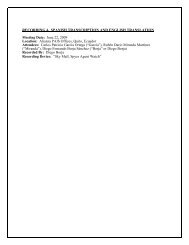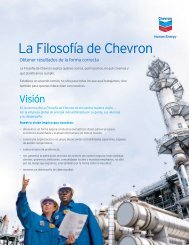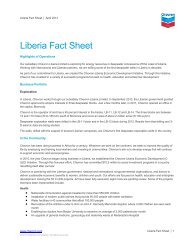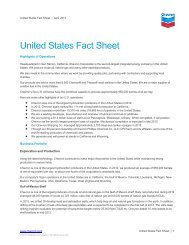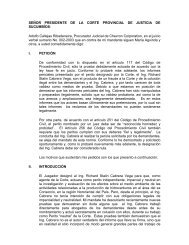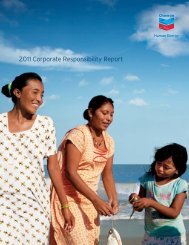Download PDF - Chevron
Download PDF - Chevron
Download PDF - Chevron
You also want an ePaper? Increase the reach of your titles
YUMPU automatically turns print PDFs into web optimized ePapers that Google loves.
2002 <strong>Chevron</strong>Texaco Corporate Responsibility ReportSocial IssuesHuman RightsBackground: The Private Sector’s RoleThe private sector can play an important role in the promotion of humanrights. The Universal Declaration of Human Rights – which is widelyconsidered the most important foundational document on human rights– states that “every organ of society” has the obligation to further humanrights. But given the complex nature of human rights issues, determiningthe appropriate roles and responsibilities of private, public and civil sectoractors is a delicate and evolving task.<strong>Chevron</strong>Texaco, along with other companies in the energy industry,often operates in countries where there is civil and political unrest, andwith this can come allegations of human rights violations. <strong>Chevron</strong>Texacoand others have a direct interest in operating in environments wherethe rule of law is applied fairly and consistently, and where individualsare treated with respect and dignity. As a result, over the past severalyears, companies have come to place greater attention on the promotionof human rights.Approach: Respecting Human Rights in Our OperationsAs expressed in The <strong>Chevron</strong>Texaco Way,we support universal humanrights and, in conducting our operations, we seek to uphold and respecthuman rights principles, consistent with the role of business. We also arefounding supporters of the Global Sullivan Principles, which address arange of human rights issues. We are committed to working with governments,our business partners, nongovernmental organizations and thecommunities where we operate to develop a fuller understanding ofhuman rights issues, how they apply to our company and what wecan do to make a contribution consistent with our appropriate role.We see this as an important step toward the furthering of humanrights worldwide.<strong>Chevron</strong>Texaco has long addressed many of the issues that fall underthe umbrella of human rights, such as employment practices, nondiscrimination,health and safety, and security of employees and companyfacilities. In 2002, we reviewed our policies, systems and practices todetermine how we might encourage better performance in this area,including more systematically integrating human rights considerationsinto our day-to-day operations. We also have engaged external stakeholdersand human rights experts to assist us in this effort.As a first step following the review, we have developed a draft HumanRights Statement, which builds on The <strong>Chevron</strong>Texaco Way and furtherdefines our commitments and approach in this area. The statement, whichwas developed in consultation inside the company and with outsideexperts, addresses and provides guidance on issues such as employmentstandards, security, conflict zones, indigenous peoples and humanrights assessments. We believe the statement will serve the followingpractical functions:> provide operational guidance for <strong>Chevron</strong>Texacoemployees and partners;> act as a framework for constructive dialogue withexternal organizations;> be the starting point for company measurementof and reporting on performance.Future Goals: Developing and Testing a Global ApproachWe know developing a Human Rights Statement is only a first step. Weare testing application of our statement in select locations, includingsome where we face significant human rights challenges. We intend touse this testing to gain a fuller understanding of how to apply the statementin an operational environment, determine where human rightsconsiderations can be more systematically integrated into existing managementprocesses, and how we can measure and monitor our performancemore effectively. We also intend to develop additional guidance,tools or training to support the implementation of the statement. Basedon the results, our aim is to revise and finalize the statement and begincorporatewide implementation in 2004.Case Study > Human Rights Dilemma in AngolaA recent event in Angola illustrates the challenging and complex issuesrelated to human rights and the boundaries of responsibility between thepublic and private sectors. <strong>Chevron</strong>Texaco faces these issues in many of thelocations where it operates.In December 2002, a report issued by the Coalition for the Reconciliation,Transparency and Citizenship – a group composed of several non-governmentalorganizations, Angolan unions and the Ad Hoc Commission forHuman Rights in Cabinda (which was formed by six citizens in the Angolanprovince of Cabinda) – alleged that the Cabinda Gulf Oil Company (CAB-GOC), a wholly owned subsidiary of <strong>Chevron</strong>Texaco operating in Angola,“should stop the complicity in allowing police investigations in theMalongo camp.”© 2003 <strong>Chevron</strong>Texaco Corporation. All Rights Reserved.18



